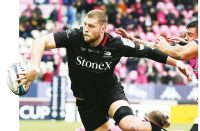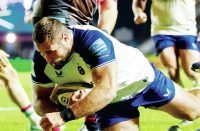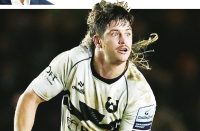 The Autumn Internationals provide an obvious point from which to do a stock-take on where England, Wales and Australia are two years out from meeting each other in the same World Cup group.
The Autumn Internationals provide an obvious point from which to do a stock-take on where England, Wales and Australia are two years out from meeting each other in the same World Cup group.
After the 2011 World Cup, Australia and Wales were clearly ahead of England, not only because they competed against each other in the third-fourth play-off, but because the tournament was a low point everywhere for England, both on the field and off it.
However, going into the Lions tour six months ago it looked different. Wales were on a high as Six Nations champions, England were recovering from a comprehensive beating after being massively outplayed by Wales in every department, and Australia were starting to falter.
The success of the Lions tour was another huge plus for Wales, but England also had the bonus of making some headway. By comparison Australia were wiped out, and were heading for oblivion after that third Test in Sydney.
However, even then I could see that with that much talent in their backline sometime after Ewen McKenzie replaced Robbie Deans, the Wallaby backline had to click.
It did not start well for McKenzie, and Australia’s Rugby Championship form against NZ and SA was not pretty. Even though they recovered enough to beat Argentina home and away, there was no way you could count on it being a rebirth of a Wallaby side to challenge the world order.
So, where are we at the end of the autumn?
In 2011 I had Australia and Wales on an equal footing. The average age of both sides was around 23 or 24, and therefore a big plus was that both teams would not be very much altered by the time of the 2015 tournament. England were trailing some way behind, not having yet opted to bring in a large number of new, younger players.
Having made those changes under Stuart Lancaster, and bedded-in a new side, there were high hopes for England in the opening game of the autumn series against Australia. The problem was that the skill level in that match was as poor as it gets from Tier One nations.
In the second half England played better than they did in the first and managed to squeeze out a win, but in the end we were none the wiser about their capabilities. It simply looked like two average teams.
After that game I would definitely have said that Australia were favourites to finish third in the World Cup group. But then Australia went to Italy and won by seven tries before going on to beat Ireland and Scotland.
As for England, they improved considerably against the All Blacks. The big difference was in their intent to attack, for instance in kicking for the touchline and keeping the pressure on before Joe Launchbury’s try. That was impressive because they backed themselves to score, and it worked.
It is your skill-set that gives you self-belief, and mental toughness stems from that. Top teams like New Zealand don’t make many mistakes because of their skill and fitness – and it was those factors that brought them home against England and Ireland.
The way the autumn results fell meant that in the week before Wales played Australia I had still got the Aussies a little way behind England and Wales – but McKenzie’s Wallabies were transformed in Cardiff.
The big difference between the two teams was that Australia had the higher skill level. There was a lot of talk about how many players Wales had out through injury, but the Wallabies probably had more who were unavailable – including Kurtley Beale, Digby Ioane, James O’Connor, David Pocock and Scott Higginbotham – and yet still outscored the home side by three tries to two.
Israel Folau’s try highlighted the difference when the Aussies kept coming, and their ball skills stayed strong despite huge tackles by George North and Richard Hibbard. This contrasted with the Welsh decision to back their skills at the end when they decided to move the ball after Plan A, the 12-man lineout, had failed.
The problem was that the Welsh did not have enough instinctive players to make it work, and they were so rushed and pressurised that Alun Wyn Jones was unable to hold onto a pass. Yet, in those same situations, you would back a Kiwi or an Aussie to be more controlled and effective.
That win has resulted in a huge autumn shift where Australia are now on top. They came very close to securing a Grand Slam tour, and McKenzie has built a good pack to provide ball for a talented backline. They have a promising leader in Ben Mowen, Scott Fardy is the dog of a flanker you need, and Michael Hooper has deputised superbly for Pocock.
McKenzie must have thought after the first two games against the All Blacks: “What have I let myself in for?” Now, he must be thinking: “Wow!” He has helped it to happen by getting Quade Cooper to play at the top of his game again, and giving him the vice-captaincy might be something of a masterstroke, because when the fly-half is at his best he is unplayable.
Wales come next in the pecking order because, when they are all fit, big runners of the ability of Jamie Roberts, George North, Jonathan Davies and Alex Cuthbert simply cannot be ignored – and nor can a match-winner like Leigh Halfpenny.
The question for Wales is whether the skill level of those big runners holds up under pressure – because that’s what it takes to win a World Cup.
Behind them come England. Sure, they missed Manu Tuilagi as a huge threat in attack and defence, but with the exception of Mike Brown there’s nothing going on in the backs. In the forwards they are at the top table. Dylan Hartley, Courtney Lawes and Mako Vunipola are all good carriers, and Billy Vunipola came online against New Zealand. Add the solidity of Chris Robshaw and Tom Wood, and it is a good unit.
The England backs had very little impact this autumn, and it is a shame that injury has delayed chances for Christian Wade and Henry Trinder. My instinct is that Luther Burrell must be given a chance at inside-centre because he is the one making the line-breaks and scoring the tries this season.
I can see the reason for picking Billy Twelvetrees as a creative 12 who also gives you a kicking option, but I believe there are more gains to be had from having an inside-centre who gets over the advantage-line quickly and leaves the defence disorganised. That is why Burrell deserves the opportunity.
However, for the moment, it is Australia out in front, Wales second, and England third.






















